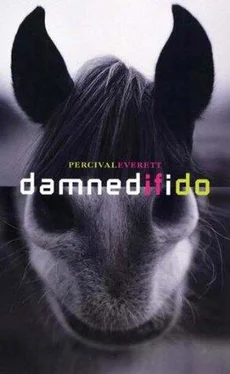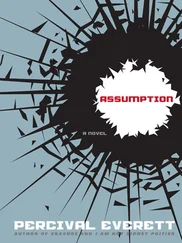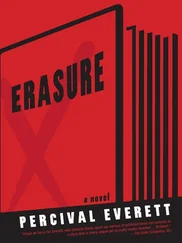“Just do what you have to do and get out.” He started out of the room.
“Was anybody working here last night?” Fragua asked.
Exasperated, Fonda answered, “No.”
“Emilio still work for you?” Lem asked. “What’s his last name?”
“Vilas. And yes, he still works for me.”
“When will he be in?” Lem didn’t like being in the room with the dead and he was beginning to get jumpy. He tried to breathe slowly and deeply.
“He’s not coming in today. I usually call him when I need him. Now, if that’s all?” He turned and walked through the doorway and out of sight.
“Man, he’s a real charmer, isn’t he?” Lem said.
Fragua ran his finger along the edge of the table. “Well, do we look at the ‘hundred’ windows?”
“If it’s that easy to get in, why bother? They probably came in through the front door.” Lem looked around the room, at the covered forms and, aside from the obvious, something wasn’t right.
“You know they say Fonda’s funny,” Fragua said in a hushed voice.
“You mean funny — ha-ha or funny — peculiar?”
“You never heard anybody say, ‘Fonda’s fonda boys?’”
“I never heard that,” Lem said, checking the doorway, “but I heard ‘Fonda dead bodies.’” Lem felt badly for talking about the man. “You know, if you’re the only undertaker in town, people are bound to talk and make up stuff.” Lem turned his attention back to the empty table. “José didn’t get up and walk out. Think we should get the kit and dust for prints?”
“I don’t think we’re going to find anything.”
“Yeah, I agree.” Lem blew out a breath, almost a whistle. “We’ve got to tell the boy’s parents.”
“Shit.”
“This sucks,” Lem said, rubbing his forehead.
“You thought she freaked out last night,” Fragua said. “You wait until that good Catholic woman finds out her boy’s not going to get a Christian burial. You wait until she finds out that some devils have stolen him.”
They didn’t tell Fonda they were leaving.
To keep his mind from the unpleasant business of talking with the Marottas and later having to fill out the case reports that he had let pile up the last few days, Lem imagined the life of Armand Fonda. He knew where the man lived, in a very nice and sprawling adobe north of town, a Cyclone fence looking out of place surrounding it. He remembered another musing of his father, that it seemed Cyclone fences did little to keep out cyclones. He laughed in his head, thinking that Fonda’s fence worked. No cyclone had touched his house since he put up the barrier. Fonda got up, he thought, had a nice grapefruit half with one of those special spoons that Lem’s mother owned but never used; it sat in her drawer full of odd and useless gadgets, like the plastic box that shaped boiled eggs into cubes. Fonda talked to his little dog, a Pekingese or something, cooed to it like it was his little boy. Then he imagined that the man had all sorts of funereal trade journals around, about caskets and embalming, Mortician’s Monthly and maybe Fluid Facts. Death was a strange thing to choose to be around.
Lem shook his head clear and viewed the neighborhood of the Marottas in the daylight. Small poorly maintained adobes stood in a row, awkward wood-framed additions poking out of most, testimony to their disregard for family planning. Sheep and chickens wandered yards and an occasional horse stood under a rough shed. The other side of the road was open, an arroyo splitting it about thirty yards in. There was a wreath on the front door of the Marotta house. The snow made it all so peaceful, so soft, gentle, and so, sadder.
Fragua knocked. Mrs. Marotta came to the door, her eyes red from crying and lack of sleep, but less confused after a night of praying. She was expecting the visit from the police so she was not thrown by it. She let them into the living room and asked them to sit, offered them coffee, which they declined.
Fragua sat, but Lem wandered off to stand by the window and look out at the field across the road and the hills rising beyond it.
“Please,” Fragua said, gesturing that the woman sit by him on the sofa.
Mrs. Marotta looked even smaller today, Lem thought, viewing her from behind, her narrow shoulders slumping toward her heart.
“Mrs. Marotta, José is gone.”
The woman took Fragua’s hand and patted it as if consoling him. “Yes, my son is dead.” She assured him that her feet were planted firmly on real ground.
“Mrs. Marotta, I don’t know how to tell you this. I’m really sorry.” These words were coming harder than the ones last night delivering news of the boy’s death. “Someone broke into Fonda’s Funeral Home last night and they took José’s body.”
The woman’s head turned so that she could take the deputy in fully. Then she shook her head. She looked as if she just couldn’t make the words have meaning.
“José is gone. His body was stolen and we don’t know where it is.”
The woman crumpled, fainted, fell over away from Fragua onto the sofa as if she’d been shot.
“Christ!” Lem said.
The daughter came running from another room and let out a short scream. Fragua lifted the woman’s head in his hands, stroked dark hair from her face. Lem went to the phone to dial the paramedics. “Mama, mama,” the girl pleaded with her mother to regain consciousness. Fragua told the girl to go get a glass of water.
Lem put down the phone. “They’re on their way. Is she all right?”
“I think so. She’s breathing okay.”
The girl came back with the water and a damp rag. Fragua took the rag and let her hold the glass while he wiped the woman’s face. Lem watched the girl tremble as she watched the still and silenced face of her mother. This was why he worked this job, to see this, to learn something about life, but he had learned nothing, was learning nothing. Life was empty here in this house where this woman kept things so clean, so tidy, and her god was not here for her, he believed this. Then on the wall he saw it. He hadn’t noticed it last night, but there it was, a crucifix affixed to the plaster and a bare-chested Jesus Christ wrapped in a skirt. These people were Penitentes. The Penitentes were a secret order of Catholics who practiced rather severe bodily penance and recondite burials of their dead. Not having a body to put into the earth was going to be a very big deal for the Marottas. Lem felt close to crying as he watched the old woman begin to come around. He heard the paramedics’ truck squeal to a halt outside. He went to the door and let them in with a blast of cold air that he was certain would aid in the woman’s revival. Fragua stood away and let the medics work.
Lem went to the girl. “Are you okay?”
She nodded.
He pulled strands of her long dark hair from her face. “My name is Lem. What’s yours?”
“Rosa.”
“Rosa, everything’s going to be all right.” He put his arm around her and gave her a hug. “Will you show me which room is your brother’s?”
She nodded and walked down the hall. Lem and Fragua followed. She stood away from the door. Fragua entered while Lem bent to address the girl. “Your mother’s probably going to need you out there.”
“I’ll start looking over here,” Fragua said as Lem entered. He was sitting on the unmade bed, opening the drawer of the nightstand.
Lem went to the dresser by the window. “These people are Penitentes,” he reported.
Fragua looked at him. “That’s real tough.”
They went back to their searching. Lem had worked his way to the bottom drawer of the beat-up dresser, peeling past the boy’s sweaters and T-shirts, when Fragua said, “Oh my god.” He turned to see the Indian holding a blue notebook in his lap. “Look at this.”
Читать дальше












